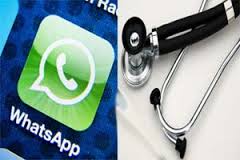 Now that WhatsApp has reached the incredible goal of one billion monthly active users spread all over the world, we can definitely affirm that the app is now much more than a social media. Just think about it. This multi-platform instant messaging app is now used in quite every field: to communicate with friends and family, or for job purposes.
Now that WhatsApp has reached the incredible goal of one billion monthly active users spread all over the world, we can definitely affirm that the app is now much more than a social media. Just think about it. This multi-platform instant messaging app is now used in quite every field: to communicate with friends and family, or for job purposes.
Nowadays also journalists use the app to share, send and obtain information. And that’s not all. Even doctors use WhatsApp to communicate with their patients. Statistics report that particularly Brazilians doctors use the app: 87% of them use WhatsApp to send messages to their patients. In Italy the percentage is 62%, while in the UK just 2% of doctors use WhatsApp to get in touch with their patients.
But despite the popularity of the app between doctors and patients, the Dutch privacy watchdog believes that WhatsApp is not secure enough for sharing patients info. According to Autoriteit Persoonsgegevens, the habit to exchange confidential patients information needs to be changed because ‘WhatsApp does not meet the standards for exchanging information about patients’ . But there is a Dutch start-up that seems to have already found a solution to this issue.MDLInking is developing a new app dedicated to doctors which promises to be safe. The company will soon have the product tested by a group of hackers before the launch expected in May.
But, as we said above, WhatsApp is particularly popular in Brazil, where most of the doctors use the app to communicate with their patients. Well, which role has played WhatsApp during the outbreak of Zika virus? An important one. In a country where the use of mobile phones is expensive, WhatsApp helped a lot in the investigation of the outbreaks of Zika and microcephaly.
In fact, since last March specialists have been sharing information about simptoms all over Brazil thanks to WhatsApp. To give you an idea of the role of WhatsApp in the country, maybe it is enough to say that half of all Brazilians regularly use the Facebook-owned app to send messages. Doctors’ work to identify Zika was certainly helped by a WhatsApp group named “CHIKV: The Mission”, where they chatted regularly and shared information.
But unfortunately, with this kind of crises, WhatsApp wasn’t always helpful, on the contrary. Sometimes its use has created panic and potential misinformation. But nevertheless it is still used, and it seems that Brazil needs it more than ever. WhatsApp is being used also to connect patients who might otherwise be isolated. Many mothers with microcephaly babies across the country are creating WhatsApp groups to exchange information about the virus and also to help each other. Unfortunately not all the mothers can afford to be part of a group chat. In Brazil smartphones are expensive, and many families are too poor to buy one.
So, today we’ve seen two different scenarios and certainly around the world there are other countries who are facing and debating similar problems. But the question is still open: do we have to follow privacy watchdogs instructions and avoid to use WhatsApp for medical reasons until our privacy is guaranteed?
